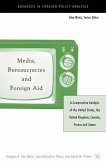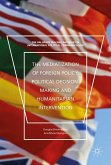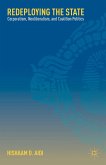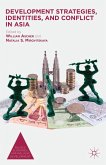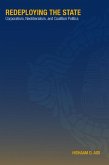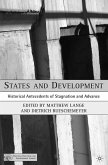This is the first sustained comparative examination of the importance of media attention on the provision of economic assistance, suggesting that the news media is an important medium for policy makers to gauge potential domestic political pressures and thus the need to be responsive and even anticipatory in addressing problems real or perceived. Particular attention is paid to the responsiveness of bureaucracies, long held to be among the most insulated institutions of government. Cross-national in scope, this book looks at the United States, the United Kingdom, Canada, France and Japan, facilitating a nuanced understanding of the interaction of international and domestic politics as mediated by the media.
"This is an ambitious - and successful - attempt at theoretical integration, with a valuable empirical component. Basing their analysis on the domestic political imperatives model of foreign policy decision-making and the principal-agent model (agency theory), Van Belle, Rioux and Potter dissect, with laudable rigor, key strands of the politics of foreign aid. Their comparative analysis of overseas development aid (ODA) programs by the five largest developed donor states adds an instructive case study dimension. And they have used their rich, genuinely comparable data to generate important findings. As such, this book goes far beyond the typical one-dimensional studies of the role of the news media and the media-bureaucracy nexus in decision-making relating to foreign aid." - Michael Brecher, R.B. Angus Professor of Political Science, McGill University
"Media, Bureaucracies, and Foreign Aid is a significant book. This study looks in a clear, comprehensive and compelling way at how media impacts upon a substantively important issue area. From an exposition informed by agency theory, the reader comes away with an excellent understanding about how bureaucracies operate in five major states with regard to foreign aid. The central, cross-national finding is that aid levels and media coverage clearly are correlated. This finding is reinforced through an in-depth treatment of the U.S. Disaster Aid program. In sum, this well-written book seems likely to move forward ourunderstanding of an important issue in international studies." - Patrick James, Professor at University of Missouri, Columbia, and Senior Scholar for the Canadian Embassy, Washington, DC, 2003-04
"This may be the definitive empirical investigation of the politics of foreign aid, and a major contribution to the theoretical understanding of media and policy processes." - Steven Livingston, associate professor at Ellis School of International Affairs, George Washington University
"This pathbreaking interdisciplinary book shows how media coverage and bureaucratic processes interact in making foreign aid policy decisions. The multi-nation comparison makes this project unique and of enduring value." - W. Lance Bennett, professor of political science and Ruddick C. Lawrence Professor of Communication, and Director of the Center for Communication and Civic Engagement, University of Washington
"Media, Bureaucracies, and Foreign Aid is a significant book. This study looks in a clear, comprehensive and compelling way at how media impacts upon a substantively important issue area. From an exposition informed by agency theory, the reader comes away with an excellent understanding about how bureaucracies operate in five major states with regard to foreign aid. The central, cross-national finding is that aid levels and media coverage clearly are correlated. This finding is reinforced through an in-depth treatment of the U.S. Disaster Aid program. In sum, this well-written book seems likely to move forward ourunderstanding of an important issue in international studies." - Patrick James, Professor at University of Missouri, Columbia, and Senior Scholar for the Canadian Embassy, Washington, DC, 2003-04
"This may be the definitive empirical investigation of the politics of foreign aid, and a major contribution to the theoretical understanding of media and policy processes." - Steven Livingston, associate professor at Ellis School of International Affairs, George Washington University
"This pathbreaking interdisciplinary book shows how media coverage and bureaucratic processes interact in making foreign aid policy decisions. The multi-nation comparison makes this project unique and of enduring value." - W. Lance Bennett, professor of political science and Ruddick C. Lawrence Professor of Communication, and Director of the Center for Communication and Civic Engagement, University of Washington


